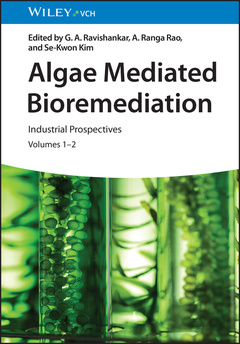Algae Mediated Bioremediation Industrial Prospectives, 2 Volumes
Coordonnateurs : Ravishankar G. A., Rao A. Ranga, Kim Se-Kwon

Develop new methods for remediating pollution with this cutting-edge guide
In a world where environmental remediation and pollution removal are becoming more critical with every passing day, the search for organic and sustainable solutions has never been more critical. Removing organic pollutants through the use of algae has become an especially promising avenue for bioremediation, with a far lower environmental impact than comparable mechanical, physical, or chemical approaches. The possibility of deriving bioenergy from the resulting biomass makes this approach even more potentially critical to a sustainable future.
Algae Mediated Bioremediation offers a cutting-edge overview of these processes and their applications. Its comprehensive approach to the problems of pollution abatement and the value of algae as environmental and biotechnological agents includes both practical solutions and key gaps in existing research.
Algae Mediated Bioremediation readers will also find:
- Case studies of successful use drawn from across the globe
- Detailed discussion of remediating aquatic, atmospheric, and terrestrial habitats
- Applications for value-added products incorporating biomass
Algae Mediated Bioremediation is ideal for biotechnologists, biochemists, natural products chemists, and other researchers working in industry or environmental research.
1. Strategies for achieving biomass production coupled to degradation to toxicants
2. Utilization of algal biomass for producing biochar, biofertilizers, and valuable algal metabolites
3. Environmental impact of phycoredmidation with special reference to CO2 sequestration
4. Removal of heavy metals from terrestrial and aquatic ecosystem by microalgae
5. Bioconversion of agricultural waste with the using of microalgae
6. Phycoremediation of municipal wastewater by microalgae
7. Phycoremediation of food processing wastewater by algae
8. Phycoremediation of palm oil wastewater by algae
9. Phycoremediation of textile wastewater by algae
10. Phycoremediation of chemical industrial wastewater (winery/ olive mill) by algae
11. Phycoremediation of piggery wastewater by microalgae
12. Phycoremediation of anaerobic digestion effluent (dairy manure, poultry manure, sewage sludge, food waste and dairy manure) by microalgae
13. Phycoremediation of dairy and poultry effluents by algae
14. Phycoremediation of sugar mill wastewater by algae
15. Phycoremediation of tannery wastewater by algae
16. Phycoremediation of pulp and paper wastewater by algae
17. Phycoremediation of sewage wastewater and industrial flue gases
18. Phycoremediation of swine wastewater and beef feedlot and by microalgae
19. Phycoremediation of aquaculture wastewater by algae
20. Production of biochar from algal biomass for wastewater remediation
21. Removal of pharmaceutical and personal care products from wastewater using microalgae
22. Phycoremediated algal biomass as biofertilizers for sustainable crop production: An overview
23. Microalgal bacterial aggregate system for wastewater treatment
24. Algal based bioremediation of water contaminated by pesticides in urban agricultural areas
25. Phytoremediation with bio business and bio economy
26. Integrated microalgae wastewater for bioremediation: An overview
27. Aquaculture wastewater treatment through microalgae for biomass production and its use in agriculture, feed, and energy applications
28. Environmental impact on blooms in fresh water and aquatic water
29. Emerging technologies of algal based wastewater phycoremediation for bio-fertilizer production for sustainable agriculture
30. Life cycle assessment of algal based wastewater treatment: An overview
31. Phycoremediation of wastewaters using synergistic approach of microalgae
32. Impact of phycoremediation potential on ecological and environmental
33. Enhancement of wastewater treatment by metabolic engineering approaches of microalgae
34. Current scenario on status, progress, and challenges of phycoremediation: An overview
35. Microalgae mediated bioremediation: Current trends and opportunities
G. A. Ravishankar, PhD, is Professor of Biotechnology at Visvesvaraya Technological University (VTU), Belagavi, Karanataka, India. He has over 35 years research experience at renowned national research laboratories, and has received fellowships from scientific bodies across the globe. His research concerns plant biotechnology and biochemistry, algal biotechnology, and food science, among other subjects.
Ranga Rao Ambati, PhD, is Associate Professor and Senior Scientist, Department of Biotechnology, Vignan’s Foundation Science, Technology and Resaerch University, Andhra Pradesh, India. He has held research fellowships and visiting positions in China, the USA, and Malaysia, and has researched extensively in algal biotechnology and food science.
Date de parution : 07-2024
17x24.4 cm
